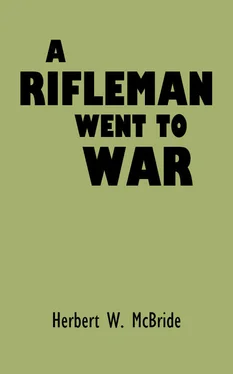A part of the course is fired with the bayonet fixed, and, during one afternoon’s shooting, I had occasion to replace three rifles which had become disabled due to the bayonet coming loose and swinging around in such a way as to obstruct the muzzle. This, I believe, was afterward corrected by a modification of the bayonet-catch but I cannot be real sure about that. I never after that fired a rifle with the bayonet on it. Even during a battle, if I wanted to do any shooting, I first removed the bayonet. I know and knew then, that this was contrary to all rules, regulations and orders, but we got away with it — that is, those of us who believed in using the rifle as a weapon of precision, in deliberate, aimed fire.
During all this time, the Machine Gunners, in addition to going through the whole infantry course, had covered the full course of instruction and firing as prescribed for machine guns, at that time. We afterward learned a lot more about that particular game and made our own rules accordingly.
Our four months in England was not entirely a period of work and worry. We followed a carefully planned schedule of strictly military work but this same schedule allowed ample time for the diversions and recreation which the High Command deemed necessary for the wellbeing of the soldier. The idea that the wars of England have been won on the cricket fields at home, has not entirely died out and I hope it never will be allowed to perish. My later experiences in some of the training camps in the United States — in 1917 — where every officer and man was kept busy at something or other from dawn to late at night, and then allowed Saturday afternoon for recreation, have convinced me that that system is wrong. The work is administered in too large doses. Six hours a day is quite sufficient for the strenuous training work — as much, in fact, as the average man can stand and derive any profit from the instruction. To drive men for from twelve to fourteen hours, as was done at Camp Shelby — just to mention one camp, which I suppose was typical — is a mistake. No doubt they can stand it, physically, but not mentally. A short day of carefully planned instruction, with several hours of absolute freedom for rest, recreation or study, will bring results far more quickly.
That was the way we worked it. I doubt if we ever put in more than six hours actual work in any day — with the exception of the times when we were out on maneuvers or on the rifle range and in both those cases there was ample time for rest and relaxation. Sunday was all our own and many of us took advantage of that day to visit many of the places of historic importance along the Kentish Coast. Our very camp was on ground that had been occupied by Caesar’s Roman Legions and there were ruins of old Roman works scattered all over that region. Saltwood and Lympne Castles still show the remnants of their work and all the main roads in that part of England were built by those same Romans.
We had only been at Sandling about a week when a couple of the members of the Machine Gun Section developed fine cases of measles. Well, that was fine. They quarantined the whole bunch of us — wouldn’t allow us to go out and march around with the rest of the battalion. At first we were ordered confined to our hut, but a few well-directed suggestions to our Medical Officer brought permission for us to go out for exercise every day, only we must go in a body and stay away from the other troops. Can you imagine anything nicer?
We would start out in the morning and climb up to the top of Tolsford Hill and take a look at France. Then we would scout down the other side and see what we could find in the way of live things — birds, bugs, snakes — anything. I always have been a sort of nut on all natural history subjects, so was able to boost the game along.
Redpath caught two young rooks which he took back and tamed so that they would fly to him whenever he called. McFarlin had a hedgehog for a while — a small and harmless edition of the porcupine. We found a wood pigeon’s nest and also some young lapwings. One day a couple of the boys brought me a snake. As most boys would do, they had killed it. Now, I do not approve of the promiscuous killing of snakes and was about to tell them so, when I happened to take a good look at the reptile — and held my peace. It was an adder, so far as I know, the only venomous snake found in the British Isles. I opened the mouth and showed them the fangs and also explained how they could tell a poisonous snake from a harmless one. Yes; we had great times during that quarantine period. If we got tired or the weather was inclement, we stayed in the hut and played poker. Hard lines for the poor soldier, eh, what?
But there was one thing about which we had a real grievance and that was the food. The time we spent in England was the only period during my Canadian service when we did not have plenty of good food. In Canada, and later in Flanders and France, we had an abundance and of the best quality, but while in England we had to put up with what the people there were accustomed to. It was pretty tough but some of us managed to get money from home and used it to supplement the meager fare. You see, the United States and Canada — and possibly the other British Colonies — have a standard of living that is undreamed of in Europe. We are just spoiled, that’s all. People can live and live comfortably, on much less than what we think is absolutely necessary. Anyway, we survived — and none the worse for it.
While we were in England many of the men were granted leave to visit relatives in various parts of the British Isles. As I had no relatives that I knew of and as I had no particular desire to go anywhere, I stayed at the camp. I had spent a good deal of time in England and Scotland, on previous visits, and had seen most of the prominent points of interest.
I did enjoy the little trips to points along the Channel coast, however. Much of the history of England is written there, from the time of the raids of the first sea rovers, on through the era of Roman domination and to the Conquest by the Normans. Nor does it end there, for all along the shore are the remains of the huge, stone towers, the Martello towers, erected as a defense against the threatened invasion by the French under Napoleon.
Then, Sandling Camp was located in the midst of a lot of the old and interesting places which have figured in the early history of England. Saltwood Castle, built in 499 by the Romans and enlarged later by the Normans, was about a mile from the camp. Here was where the conspirators met and planned the assassination of Thomas à Becket at Canterbury, which was only some sixteen miles away and which I visited many times. Hythe, one of the old “cinque ports” was only a few miles distant, and in it was the old church which dated from the time of Ethelbert, King of Kent. In this old church crypt lie the bones of hundreds of persons which have been there since the time of the Crusades, and in the church there were the arms and armour of some of those old-timers who had been on those same Crusades. But to me, the most interesting of all was a tablet on the wall, “To the memory of Captain Robert Furnis, Commanding H.M.S. Queen Charlotte. Killed at the Battle of Lake Erie: 1813.” Perry’s famous victory, and Camp Perry, so far away, both came to mind as I stood before it.
Only three or four miles away was Monk’s Horton, Horton Park and Horton Priory. This latter church dates from the twelfth century and looks just about as it did when built. There also was Lympne Castle, one of the old Roman strongholds, and Caesar’s Plain, and Caesar’s Camp, where Julius Caesar is supposed to have spent his time on that memorable expedition to England. Also there was Hastings and Battle Abbey, where William the Conqueror defeated Harold and conquered England. Many of the roads over which we marched had been built by the Romans and every town and village we came to had its history running back for centuries. To me it was all very interesting and for those who did not care for ancient history there were Sunday trips to Ramsgate, Margate, Deal, and Dover.
Читать дальше











